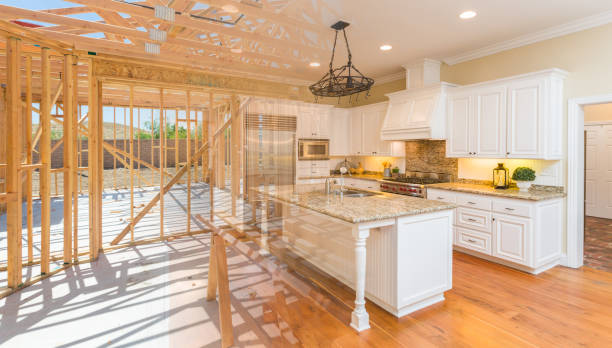Do Home Renovations Impact Your Homeowners Insurance?

Thinking about renovating your home, installing a pool, or upgrading your plumbing system? While these projects can increase your home’s value, it’s important to understand how they can also affect your insurance coverage.
Some renovations may drive up your premium because your insurance rate is determined by your home’s square footage and the cost of potential repairs or replacements, based on the age and type of your appliances and building materials. However, certain upgrades can earn you discounts if they reduce risk.
Let’s explore why home renovations impact your homeowners insurance—and why it’s crucial to inform your insurer before you start.
Do Home Renovations Increase Your Insurance Costs?
Some renovations can raise your insurance costs, often because you’ll need to increase your coverage limit. This typically happens when upgrades expose you to greater liability or add significant value to your property.
Swimming Pools
Installing a pool can significantly increase your premium due to the risks involved. Insurers often require a locking fence around the pool for safety. In some cases, adding a pool may even void your current policy, requiring you to obtain new coverage.
Upgraded Systems
Replacing or upgrading electrical or plumbing systems can also raise your premium, as newer systems may be more expensive to repair or replace if damaged.
Home Offices
Adding a home office could boost your home’s value but also your insurance costs. If you operate a business from home, your insurer might require an endorsement for business-related assets and equipment—or a separate home business policy providing liability coverage and protection against crime and worker injuries. Check with your insurer or independent insurance agent to see if your policy excludes business use of personal property.
Extensions and Luxury Upgrades
Building an addition or upgrading a kitchen or bathroom will likely increase your insurance costs, as you’ll need more dwelling coverage to account for the new, often higher-value materials. Similarly, adding luxury fixtures or expensive personal items can exceed your current personal property coverage limits. Learn more about insuring high-value belongings like jewelry.
Finished Basements and Sheds
Finishing a basement may require additional sewer backup coverage. Building a shed or other outbuildings could also impact your coverage—ensure your “other structures” limit is sufficient.
Although upgrading your insurance may seem costly after investing in renovations, it’s essential for protecting your investment and maintaining your home’s value.
How Can I Save Money on Homeowners Insurance?
Some renovations can reduce your insurance costs by lowering risks.
Roof Upgrades
Replacing or renovating your roof can help your home better withstand harsh weather, reducing the likelihood of expensive repairs and potentially lowering your premium.
Fire and Security Systems
Installing sprinklers or a home security system can reduce your insurance costs by making your home safer from fire and theft.
What Your Insurance Company Needs to Know When You Renovate
Small projects like painting or planting bushes usually don’t require notifying your insurer. However, for major renovations, you should contact an agent to discuss whether you need to adjust your coverage—or if you qualify for discounts.
Before starting renovations, be prepared to provide cost estimates and a timeline. Afterward, your insurer may request building permits, photos of completed work, descriptions, and contractor agreements.
Talking to an agent early ensures your policy reflects your home’s updated value and avoids potential claim denials later. Failure to notify your insurer could be considered a breach of contract, leading to denied claims.
Types of Insurance to Consider When Renovating
In addition to adjusting your homeowners policy, you may want to explore other types of coverage during renovations:
- Builders Risk Insurance: Covers materials, fixtures, and equipment installed during construction or renovation.
- Vacant Home Insurance: Needed if you’ll be living elsewhere during renovations, as standard policies may not cover vacant homes.
- Contractors Insurance: Essential if you hire third-party contractors; it protects against property damage and worker injuries. Always request a certificate of liability insurance from your contractor before signing any contracts.
Still have questions about how renovating your home could affect your insurance? Speak with an independent agent at C&S today!
